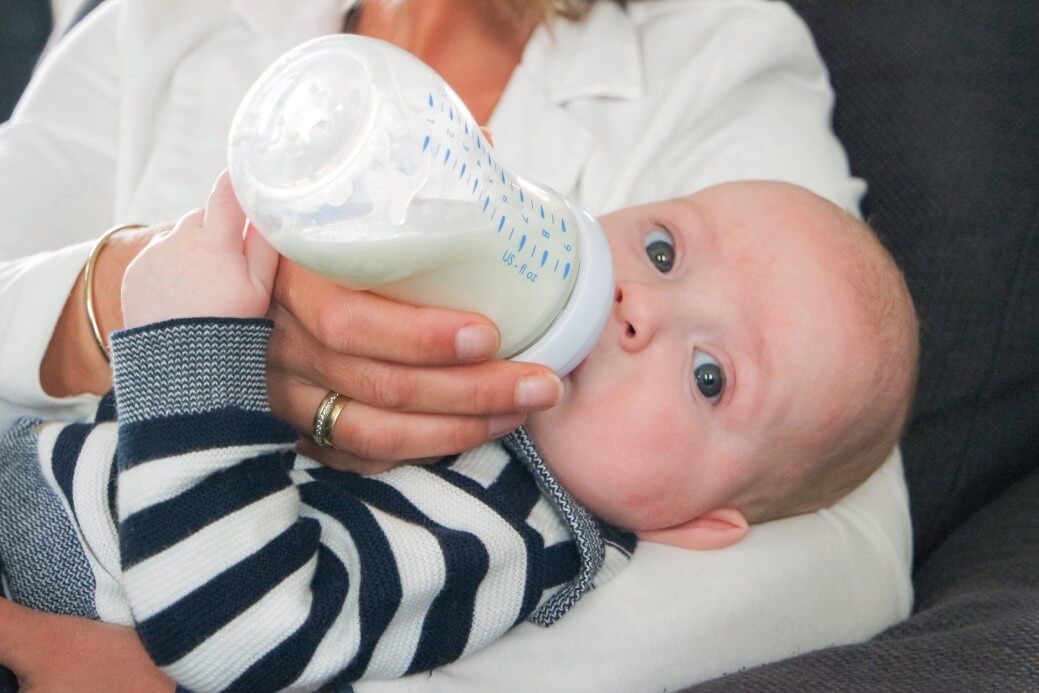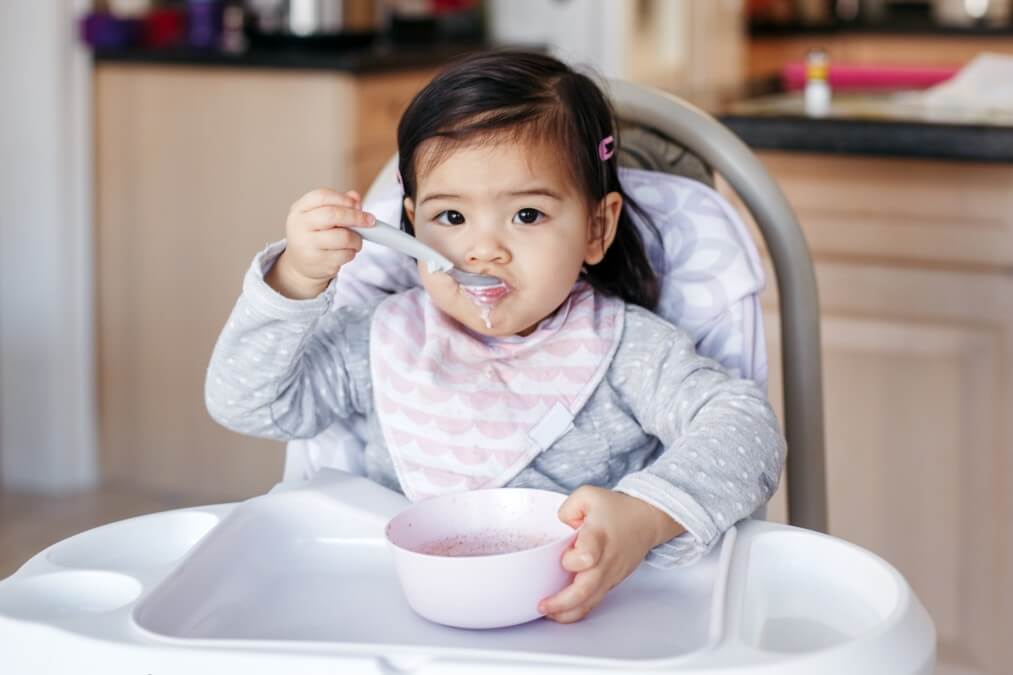It’s no secret that babies love milk, literally crying out to get just as much of it as they can into their bellies while they are still young. But can babies drink almond milk?
No, babies should not drink almond milk. You should give babies milk that isn’t breast milk (or formula) until they get about a year old. Wait until your babies a toddler before giving them a sip of almond milk or any other type of milk other than breast milk.
To shine a little bit more light on why it’s a bad idea to give babies almond milk we’ve put together this detailed guide.
Can Babies Drink Almond Milk?
Babies get the overwhelming majority of nutrients they need to not just survive but thrive in their early days from the milk that they drink.
The milk babies get from their mothers is absolutely loaded top to bottom with all the vitamins and nutrients they need, but it’s also produced in a highly bioavailable “delivery mechanism” that makes it really easy for babies to digest.
Almond milk, on the other hand (just like traditional dairy, as well as variations of milk), can wreak havoc on the little digestive systems of babies.

Why Can’t Babies Have Almond Milk?
For starters, almond milk just doesn’t have the same nutritional value as breast milk.
Sure, almond milk can be fortified with nutrients like Vitamin A, Vitamin C, Vitamin D, and calcium.
But in many cases, fortified almond milk also contains sweetening agents, thickening agents, as well as all kinds of artificial ingredients and flavors as well.
That’s not the kind of stuff you want to be pumping into a newborn baby (or any child that’s still going through critical developmental stages).
On top of all of that, almond milk isn’t going to be processed or digested as easily by babies as the milk they get from their mothers will be.
That’s going to cause all kinds of trouble in their guts (from gas to cramps and diarrhea, and maybe even worse issues) that you don’t want to put these little ones through.
At What Age Can Babies Drink Almond Milk?
As a general rule of thumb, you should avoid giving your babies any kind of milk other than breast milk at all until they hit about a year old. That includes almond milk, soy milk, cow’s milk, goat milk, etc.
At this point in time, babies have usually built up enough “digestive stamina” to handle new things.
You’ll still want to make sure that you give them very small amounts, just to sort of “train” their bodies to handle these new substances. But around the year old or so most babies can handle almond milk.
That being said, there’s really nothing wrong with waiting even a little bit longer.
Give your baby a year or two until they start trying other milks if you really want to stay on the safe side of things. They aren’t missing out from a nutritional standpoint, that’s for sure!

Cow’s Milk vs Almond Milk for Babies
The nutritional content in milk from cows is quite a bit different from almond milk.
A single cup of whole milk, for example, as close to 8 g of fat in it. Babies need fat when they are developing, providing tons of fuel for their brain to grow as well.
On the flip side of things, a single cup of unsweetened almond milk is only going to bring 2.5 g of fat to the table – and that’s just not enough in these critical stages.
Dairy milk also has a lot more protein than almond milk.
Again you’re looking at about a grams of protein per cup of whole milk compared to about 1 g of protein in almond milk that has already been fortified.
Protein content is even worse in almond milk that hasn’t gone through the fortification process!
Related: Is Almond Milk Good For Pregnancy?
How Does Almond Milk Compare to Breast Milk?
As far as the comparison between almond milk and breast milk is concerned there’s really no comparison to be made at all.
Almond milk may be a healthy alternative for fully developed adults that are getting core nutrients in other ways, adults that are turning to almond milk as a “milk substitute” while recognizing that it’s not anywhere close to the real deal from a nutritional standpoint.
The same cannot be said about babies that are still feeding from their mothers milk.
Breast milk is loaded top to bottom with ALL the vitamins and ALL the nutrients that babies need to survive and thrive in this young stage of development.
It’s the best thing that babies can consume when they are brand-new, and it’s still about the best thing they can have a right up until they get to a year or two.

FAQ
Can Newborns Drink Almond Milk?
Newborns should absolutely not, under any circumstances whatsoever, be given almond milk.
This is only something that you should consider giving your child after their first birthday, and really it’s better if you wait until they are even a little bit older than that.
The nutrients in almond milk just aren’t there to act as a 1:1 replacement for everything that babies get from their mother’s milk.
Can an 8-Month-Old Drink Almond Milk?
Again, eight-month-old babies really shouldn’t be given almond milk until they hit 12 months of age (and ideally even a little bit older than that).
At eight months old babies might look like they are pretty well established. They’ve gotten some height and some weight on them, have grown a bit of hair, and are a whole lot more active than they were when they were newborns.
Don’t let that trick you into believing that they can fool around with foods that young children or adults can eat, though.
These babies still need nutrient dense milk to make sure that they reach their full development potential.
Can a 10-Month-Old Drink Almond Milk?
At around 10 months of age you’re getting close to when babies can have almond milk (just a little bit as a treat every now and again, not as a meal replacement).
But you’re still a couple of months shy – and maybe even a year or more shy if you want to stay on the safe side of things.
Really try to drive to at least a year until you give your baby almond milk. There aren’t any benefits for giving them almond milk earlier, only drawbacks and downsides.
If you can wait longer than that it’s all the better!
Related: Can Babies Have Oat Milk?
Can Babies Drink Almond Milk at One?
Around one year old babies are going to be developed enough to handle almond milk – a tiny little amount every now and again only – from a digestive standpoint.
At this point in time, though, babies cannot be drinking almond milk as their primary source of nutrition.
You’ll end up wreaking havoc on their health and maybe even putting their little lives in jeopardy with that kind of approach.
If you can hold off, and recognize that there are no real benefits to giving babies almond milk earlier than you have to, try to wait until your baby is two (or older) before they get almond milk.
Can Babies Drink Unsweetened Almond Milk?
There’s no real distinguishing between unsweetened almond milk and sweetened almond milk when we are talking about babies.
Toddlers, yes – it’s probably a good idea to give toddlers that are drinking almond milk for the first time and unsweetened version.
But because babies shouldn’t be drinking any almond milk whatsoever until they hit the toddler phase of life it doesn’t matter if you’re thinking about unsweetened or sweetened.
They just shouldn’t be getting any at all!
Can Babies Have Almond Milk in Cereal?
Babies shouldn’t be getting almond milk mixed in their cereal, in with their formula, or in with any other nutrition that they are getting until they hit the one year old milestone (and it’s even better if you can hold them off a little longer).
After-year-old or so, though, a splash of almond milk in their cereal every once in a while isn’t going to be the worst thing ever.

Related: Is There Milk in Nutramigen?
Can Babies Have Almond Milk in Smoothies?
Once your baby celebrates their first birthday you might consider whipping them up a smoothie, but it’s probably best if you wait another year (or even a little bit longer than that) until you start coming up with these concoctions for them.
If your baby is already a year old and has shown decent digestive tolerance for almond milk a taste or two of an almond milk smoothie shouldn’t cause any trouble.
Can Babies Have Almond Milk in Cooking?
Cooking almond milk up in food for your baby isn’t a terrible idea, so long as you are using 100% pure almond milk and not almond milk that has been fortified, almond milk that has sweetened agents added, or almond milk with artificial ingredients or thickening agents.
When you are feeding your babies you need to think about their health and their nutrition first and foremost. Forget about adding a splash of almond milk to add a bit of flavor until they are a little older.
Related: Can You Cook With Almond Milk?
Can Babies Have Almond Milk in Porridge?
Mixing almond milk into the porridge you feed your babies is okay if you’re looking to add some extra flavor, but you really have to make sure that it is as close to pure almond milk as you can get.
You don’t want to be giving your baby sweeteners, excess sugar, thickening agents that might not settle in their stomachs well, or artificial ingredients that could throw their development out of whack.
